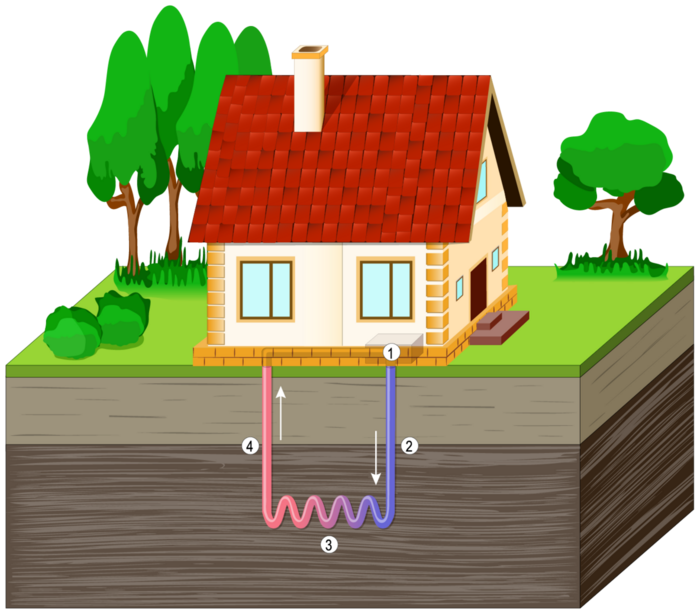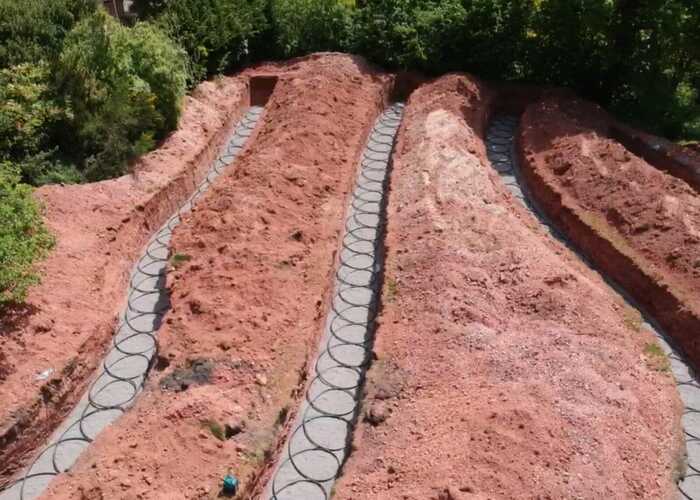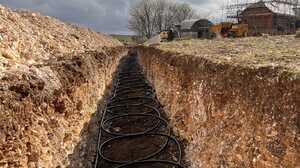Ground Source Heat Pumps: Pros and Cons
Thinking of installing a ground source heat pump in your property? Let us guide you through some of the pros and cons to consider before making the investment.

Evergreen are experienced installers of Ground Source Heat Pumps across Dorset, Devon and Somerset, enabling you to heat your home in an environmentally friendly way and qualify for the BUS Boiler Upgrade Scheme.
Evergreen have a great team of qualified, experienced and product trained engineers. We have been installing renewable technologies throughout Dorset, Devon and Somerset since 2011.
We fit the excellent British made Kensa Heat Pumps.

WHAT IS A
GROUND SOURCE
HEAT PUMP?

WHAT ARE THE MAIN ADVANTAGES OF A GROUND SOURCE HEAT PUMP?

HOW DOES A GROUND
SOURCE HEAT PUMP
ACTUALLY WORK?

METHODS OF
OBTAINING
NATURAL HEAT

CASE STUDIES OF GROUND SOURCE HEAT PUMP INSTALLATIONS

Ground source heat pumps are extremely energy efficient, for every one unit of electricity used (to drive the pump and compressor), around 4 units of heat are produced. Buried pipes or ‘slinkies’ are used to absorb heat from the ground. Other methods include ‘pond mats’ or ‘open loop’ systems which take heat from ponds, lakes or rivers.


This short video by Kensa Heat Pumps gives a great explanation of what a heat pump is and how a ground source heat pump works. Evergreen are accredited installers for Kensa Ground Source Heat Pumps and have worked with them since 2015.
Evergreen are the leading Ground Source Heat Pump
installation company in Dorset, Devon & Somerset
Heat pumps run on electricity. Running costs are comparable with natural gas fired systems, and lower than oil, LPG or existing all electric systems. If you have a solar PV system, then free self-generated power can contribute to the running of the heat pump, further reducing running costs
Heat pumps are a green technology. Heat pumps do have an impact on the environment as they need electricity to run. However, they are very efficient and the electricity grid is getting greener, relying less on fossil fuels. The heat extracted from the ground or water source is constantly being renewed naturally.
No LPG or oil deliveries required, and no connection to the gas grid needed either. Heat pumps run on electricity and most homes are already connected to the electricity grid. For this reason heat pumps are often ideal for properties in rural or more isolated locations.
The government backed Boiler Upgrade Scheme (BUS) supports the decarbonisation of heat in buildings. It provides upfront capital grants to support the installation of heat pumps and in homes and non-domestic buildings in England and Wales. Acting on behalf of property owners, installers can apply for £7,500 towards the installation of a Ground Source Heat Pump.
Heat pumps are very reliable. We recommend annual servicing to ensure your heat pump runs efficiently for many years.
A ground source heat pump is a renewable heating system that transfers natural heat from the ground into your home. It works by circulating a special fluid through a network of pipes buried underground. These pipes absorb heat from the earth, which maintains a relatively stable temperature throughout the year, typically between 8°C and 12°C in the UK. The absorbed heat is then compressed and used to provide heating and hot water. Because the ground constantly renews this energy, ground source heat pumps offer a reliable and highly efficient way to heat your home all year round.
Yes, ground source heat pumps are particularly well-suited to the UK climate. The relatively mild winters and consistent ground temperatures in the South West mean that the system can perform efficiently throughout the year. Unlike air source systems, ground source heat pumps are not affected by changes in air temperature. This makes them an especially stable and dependable option for rural or off-grid properties, where connection to gas mains may not be available or desirable.
The cost of installing a ground source heat pump typically ranges from £14,000 to £24,000. This depends on several factors, including the size of the property, the type of ground available, and the method used to extract heat. For example, systems using slinkies or horizontal loops are usually less expensive than borehole installations, which require deep vertical drilling. While the upfront investment is higher than some other heating systems, the long-term savings and available government funding can make it a very cost-effective choice over time.
The Boiler Upgrade Scheme offers a government grant of £7,500 to help with the upfront cost of installing a ground source heat pump. Funding is available to most homeowners and landlords in England and Wales, provided the property has a valid Energy Performance Certificate (EPC) and no outstanding recommendations for loft or cavity wall insulation. Evergreen is a registered installer under the scheme and will manage the application process for you, ensuring that all eligibility criteria are met and that you receive the full amount you’re entitled to.
A closed-loop system uses a sealed network of pipes that circulate fluid underground, absorbing heat from the surrounding soil or water. These can be installed horizontally in trenches (known as slinkies), vertically in boreholes, or submerged in water sources like ponds. An open loop system, by contrast, draws water from a river, lake, or well and passes it through a heat exchanger before returning it to the source. Both systems can be highly efficient, but closed-loop systems are more commonly used in residential settings due to their predictability and lower environmental impact.
The amount of space required depends on the type of ground array installed. Horizontal loop systems need a fair amount of land; typically a garden or field area, where the pipes can be buried at a shallow depth. Borehole systems, on the other hand, need far less surface area but require deeper drilling, which can be more costly. Pond or water-based systems require access to a suitable body of water. Evergreen will carry out a detailed site assessment to determine the most appropriate solution based on your property and land conditions.
Ground source heat pumps are among the most efficient heating systems available. They typically produce around four units of heat for every one unit of electricity used. As a result, running costs are generally lower than oil, LPG, or direct electric systems. If combined with a solar PV system, the electricity needed to run the pump can be partly or fully generated on site, further reducing costs. Over time, the lower running costs can help offset the higher installation price and provide a strong return on investment.
Ground source heat pumps are designed to be low-maintenance. Once installed, the buried pipework can last for over 50 years with no need for replacement. The main heat pump unit, usually located indoors, should be serviced annually to check filters, pressures, and controls. Routine checks help keep the system running efficiently and extend its lifespan. Evergreen offers ongoing servicing and support to ensure your system continues to perform reliably for many years after installation.
With proper maintenance, the main heat pump unit typically lasts between 20 and 25 years. The ground loop system – the network of pipes that collects heat – can last for over 50 years. Because there are fewer moving parts compared to traditional boilers, ground source systems tend to be more reliable and less prone to breakdowns. Investing in a quality installation and regular servicing is the best way to ensure long-term performance and efficiency.
In most residential cases, ground source heat pump installations fall under permitted development rights and do not require planning permission. However, if your property is listed, located in a conservation area, or the installation involves a significant water source or borehole, you may need to apply for consent. Evergreen’s team is experienced in managing these requirements and can provide clear guidance and support with any planning or environmental permissions that might be needed.
Yes, a properly designed ground source heat pump system can comfortably heat your entire home and provide all your hot water. It works with radiators, underfloor heating, or a combination of both. The key is ensuring the system is correctly sized to match the heating demand of the property. Evergreen carries out a full heat-loss assessment for every installation, ensuring that your system is able to meet the specific energy needs of your home.
Evergreen has been installing renewable heating systems across Dorset, Devon, and Somerset since 2011. As a trusted installer of Kensa Heat Pumps – a British manufacturer known for their quality and performance – Evergreen delivers a reliable, local service backed by technical expertise. All installations are handled in-house by experienced, MCS-certified engineers, with no subcontractors involved, (except for ground works or borehole drilling). From site surveys and design to installation and aftercare, Evergreen offers a complete service and ongoing support for homeowners looking to make a long-term investment in sustainable heating.
Yes, ground source heat pumps can be installed in older properties, provided certain conditions are met. The key consideration is the energy efficiency of the building, particularly insulation levels. A home that retains heat well will allow the system to operate efficiently and maintain comfort. If your home has solid walls or minimal insulation, upgrades may be recommended before installation. Evergreen will assess the property and suggest any necessary improvements to ensure the system performs effectively in an older building.
Installing a ground source heat pump is more involved than other systems, particularly when it comes to the groundworks. If you opt for a horizontal system using slinkies, excavation of trenches is required. Borehole systems involve drilling, which takes up less space but requires specialist equipment. The internal work is similar to that of other heating systems, involving installation of a heat pump unit, hot water cylinder, and system controls. Evergreen takes care to minimise disruption and works to an agreed schedule, keeping you informed throughout the process.
If your property doesn’t have enough space for a horizontal ground loop, there are still viable options available. Boreholes can be drilled vertically, often to depths of around 100 metres, which require much less surface area and are ideal for smaller plots. If you have access to a pond, lake, or river, a water-source system may be possible. Evergreen has extensive experience in designing and installing alternative ground loop configurations and will recommend the best approach based on your site conditions and budget.
Got another question? Get in touch

MCS is a mark of quality. Using an MCS certified installer ensures that equipment meets good standards of performance and that installers are technically safe and competent. MCS certified Installers have undergone a rigorous vetting process to demonstrate that they adhere to MCS Standards.
"It is a pleasure, but very rare, to be in a position to write to any firm to tell them that we are most happy with their service. From the first day we contacted yourselves we have noticed a positive ‘can do’ attitude, and this has been justified by the actions and results since that day. The positivity has been reinforced by each member of the company we have had contact with, and the quality of the work that has been done and is apparent backs up the assurances given.
The depth of knowledge that has been demonstrated, and has been proven, has given us a degree of peace of mind; specifically we were most impressed that when we were faced with a potential difficulty in regards to power supply you went the extra mile and, through discussions with Kensa Heat Pumps, were able to re-engineer matters to resolve the situation.
Whilst we have had specific contact with Paul and Ian, and those who installed the Ground Source Heat Pumps on site, we are sure that all the team including those backroom staff whom we might not have dealt with directly are of the same positive attitude and professionalism.
Thank you all. We are delighted with the service we have had from Evergreen."

Pipes are buried in the ground or submerged in water. A fluid is circulated through this 'closed loop' picking up heat as travels.

Water is extracted from a river or other water source and is passed through a heat exchanger before being returned.